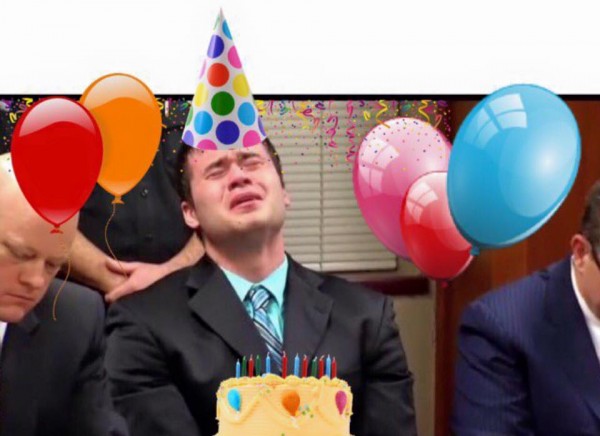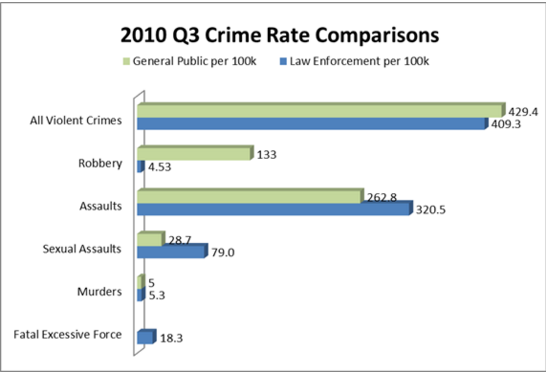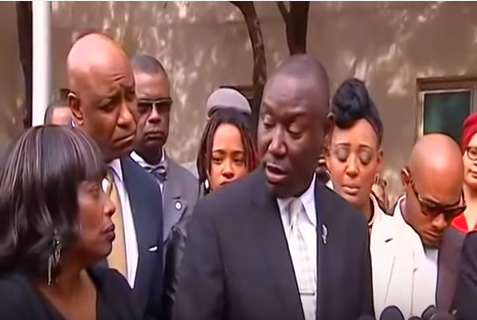
Content warning: this piece contains general discussion of rape.
On his 29th birthday, December 10th, former Oklahoma City Police officer Daniel Holtzclaw, who targeted low income, criminalized Black women and girls for sexual assault while on duty, was found guilty of 18 of the 36 charges brought against him. He now faces up to 263 years in prison when he is formally sentenced next month. His crimes were calculated and monstrous. But as uplifting as it is to hear his vindicated victims sing “Happy Birthday,” I can’t help but feel like the knife stuck six inches into my back has only been pulled out three inches.
Holtzclaw’s crimes are far from a rarity. The Associated Press reported that from 2009 to 2014, almost 1000 officers have been decertified or terminated due to sexual misconduct. A 2010 study published by the Cato Institute’s National Police Misconduct Reporting Project reported that sexual misconduct was the second most common form of police misconduct. The report also found “assault and sexual assault rates significantly higher for police when compared to the general population.”
Holtzclaw’s crimes were hardly covered by major outlets and that tepid coverage robbed me of any lasting feeling of accomplishment in his conviction. And according to prosecutors, Buzzfeed, the Daily Mirror, The New York Times, Jezebel, the Daily Beast, the Washington Post and many other publications, this rapist is behind bars because he “messed up“: he raped the “wrong” woman, Janie Ligons, a woman with no previous criminal record, no record of drug use or sex work—someone who felt free to report her rape. This woman was someone whose assault demanded an answer.
If Ligons is the “wrong” victim, then am I and hundreds of thousands of other Black sex workers the “RIGHT” victim? Historically speaking, in America, the answer is yes, and that terrifies me. It’s hard to puff out your chest and declare the Holtzclaw verdict proof of progress when he wouldn’t have been taken off the streets had Ligons not come forward. Ligons filed a civil suit against Oklahoma City prior to the criminal trial. She seeks damages based on the fact that Holtzclaw was already being investigated for sexual misconduct but was allowed to continue to patrol low income Black neighborhoods. At least one other woman, identified as TM, made a report to police previously that Holtzclaw assaulted her before Ligons was raped.

If the department knew about almost all of the assaults prior to Ligons, as her civil suit contends, what were they waiting for? Perhaps the wait was for a more sympathetic victim, one a jury wouldn’t assume had it coming. As it is, rape convictions are hard to come by and convictions against cops even harder. If civilians rarely go to jail for abusing sex workers, for abusing women who use drugs or have been incarcerated, more rarely still are cops held accountable.
According to the American Civil Liberties Union, 30% of incarcerated women in the United States are Black, although Black women are only 13% of the female population. The ACLU also found that 40% of women are in jail for drug offenses. While Whites are more likely to use drugs, Blacks are more likely to be arrested and face longer sentences for drug related crimes. DePaul University Professor Traci Schlesinger writes in the criminal justice anthology, Criminal Justice and Ethnic Diversity, that “the criminalization of sex work has followed a trajectory similar to the criminalization of drugs, an entrenched system of racialized enforcement that focuses primarily on people of color while ignoring similar crimes committed by whites.”
Police have more access to Black women because our communities are over-policed. The same cops that are more likely to commit a sexual crime are given power over already at-risk women. Practices like stop and frisk and condoms as evidence give officers a perfect opportunity take advantage of women they’re trained to see as criminals until proven otherwise. Many sex workers are well aware of the threat of violence, particularly sexual violence, which looms over every interaction with law enforcement. The most vulnerable workers face multiple stigmas of poverty, drug use, and criminal records in encounters with the police. In America, Black women exist in bodies that are simultaneously sexualized and criminalized.
Keeping these tragic facts in mind, the media’s callous descriptions of Holtzclaw’s assaults, his victims, and the language used to describe how he was brought to justice highlight just how expendable Black sex workers, drug users, and those with criminal records are. Stories written about this case often make sure to note that Holtzclaw is a former football star, while his victims—including a minor—are identified mostly by their arrest records.

In court, Assistant District Attorney Lori McConnell made sure to explain to the jury that Holtzclaw was “sexually stimulated by using his power to make them show their private parts to him.” She continued saying he “targeted drug addicts and other women with felony records who he could intimidate with threats of being jailed.” His pattern was clear, but investigators let him continue to terrorize a lower income community waiting for him to “mess up.”
“Who will believe these women, and who will care?” McConnell said.
Not investigators, not the public at large, and sadly, not even other women and sex workers. No major feminist organization rallied behind Holtzclaw’s victims. While local organization OKC Artists for Justice worked day after day to raise awareness about the case and demand a conviction and a life sentence they were not joined by national sex workers’ rights or feminist groups like Sex Worker Outreach Project, National Organization of Women, or INCITE!. The most at risk in our community are often left to fend for themselves.
The silence of national feminist organizations is not out of the ordinary. There was no national outcry in 2006 when Texas police officers beat a 12-year-old girl outside her home on the assumption that she was a sex worker, nor when hotel employees called police on two Black trans women they suspected of being sex workers. Few made a peep after the recent Ashton O’Hara trial, for the killer of a Black trans person who was stabbed and run over with a car. National sex worker groups didn’t organize around the still unsolved murders of two Black sex workers in Jacksonville, Florida.
With this shroud of silence over all these “right” victims, why wouldn’t a man who has the power of a badge and the privilege of being White passing not think he would get away with it? We’ve created hundreds of Holtzclaws, and they’re still out terrorizing communities with impunity. We haven’t made progress when the respectability of one Black woman has to be enough for 12 others to only get a 50/50 shot at justice. As a community, sex workers will only make progress when “stigma kills” isn’t a catchphrase reserved for the most elite in our ranks.
Thank you for this.
Thank you.
Very informative article and I am sorry for what happened to these ladies. I did in fact hear about it from a local news organization in San Francisco so it is being covered…but agreed that it is much less publicized that should be.
Coming from a non-black woman, I can’t begin to understand the frustration and resentment that this kind of crime and indifference to it creates.
I suggest for those truly passionate in change…to think about why the American public DOESN’T CARE, as you so aptly suggested in the article. On twitter it’s the same. Many claim that there isn’t coverage or implicitly or explicitly say that it’s because the women are black. If that’s the case then:
What powers that be control the media and what stories get out?
Does public perception of black women matter at all on what stories get out?
Why do you think “people” don’t care?
The obvious answer to this is racism and I agree. It’s a huge problem …but maybe we can chip away at it by getting to the ROOT of this perception of black women and black people period.
Just my opinion.
[…] on my birthday? But I was led to believe by the society that I could target this group of women because no one cared about them. But I’ve gotten away with this for so long that I have come to think of myself as […]
Cops sexually abusing prostitutes and people they catch with drugs is something which has been a HUGE issue for me for some time now. Long time sex worker activist Norma Jean Almodovar has been shouting from the mountain tops about this for many years. The Holtzclaw case was not the first, and while it has been framed as an attack on black women, and perhaps Holtzclaw did single out black women, what is obvious to me, is that he was preying upon prostitutes and women with criminal records. Looking at the broader picture, as in the wide variety of other cops, DA’s, Judges and law enforcement who have preyed upon sex workers with the complicit activities of prosecutors and investigating officers once a courageous woman has stepped forth to report, it is not an issue about race, it is an issue about opportunity and abuse of power. Black officer Anthony Rollins of Alaska had been protected for years by his badge, and had over 30 victims once finally brought to justice. Hispanic cop Sergio Alvarez of Sacramento had over 35 victims before he was finally brought down. There is a long list of these cop predators at Norma’s site in addition to an even longer list of pedophile cop abusers. I’ll never forget reading about the case of a police chief raping a three year old baby twice and getting PROBATION. many of these disgusting meat bags get questionable sentences and too often don’t have to register as sex offenders. THANK GOODNESS this case got ANY press at all! The Rollins and Alvarez cases happened as recently as 2012-13 and did you know about them? 35 victims is a LOT. their victims were of various ethnicities just as the predators are of various ethnicities. But we can JUST focus on ‘certain’ ethnicities which is what has happened in the Holtzclaw case. Had the women been white, I’m wondering if there would’ve been any press other than a few local reports. Let’s not forget that it took a woman with no criminal history for the Holtzclaw case to gain any traction! Otherwise, had he not raped a woman with a clear record, regardless of anyone’s skin color, he would likely still be raping. Very sad. Our people should be heard and appropriate action taken by authorities when they are sexually assaulted or raped by law enforcement. Let’s not forget that in various regions of the USA cops & FBI agents are allowed sexual contact with sex workers to arrest them. I don’t call that consensual. Or the woman judge who decided gang rape of an escort at gun point was merely ‘theft of services’. Or the other bitch Judge who said she wouldn’t bring rape charges against a cop because she didn’t think jurors would accept that a prostitute could be raped.
Narratives can help. But as we have seen far too often, narratives can also derail much needed discussions so that nothing really changes.
Holtzclaw one among many: https://youtu.be/wI8e_IRr3yM
Minors considered to be trafficking victims don’t trust cops: https://youtu.be/G5fZ1kIrhi8
[…] Daniel Holtzclaw, Black Women, And The Myth of Police Protection, N’Jaila Rhee. […]
[…] up,” we did not reach out to those affected, as pointed out by members of our SWOP network and here on Tits and Sass and by our […]
[…] leads to predators like Daniel Holtzclaw feeling entitled to prey on poor, often majority non-white communit…, and surprising the country on the rare occasions they are held […]
[…] Black activists and community members. At the same time, a number of cases this year, such as the rape of multiple sex working and drug using Black women by Oklahoma City police officer Daniel H…, as well as the sexual exploitation of Latina teenage sex worker Celeste Guap/Jasmine Abuslin by […]
[…] assaults? In the moments where I compare the fictional scam of Bambi to the real life stories of sex working Oklahoman Black women who were raped and assaulted by Officer Daniel Hotlzclaw? I am […]
[…] threat of arrest has historically been very effective for rapist cops to wield against sex workers. Ex-Oklahoma City police officer Daniel Holtzclaw assaulted 13 Black women and young girls, many of them drug-using sex workers and almost all possessing records. It was only because the […]
[…] of sexual exploitation, and now, even teenagers as a perk of their jobs. We’ve all read about Daniel Holtzclaw. It was barely a month ago we discussed finding out that, in 35 states in America, it’s basically […]
[…] who leveraged his size and strength into a job with the Oklahoma City Police Department and then spent a good portion of his career serially raping Black women, including drug users and outdooor se…. Feminist organizations were eerily silent after Holtzclaw’s arrest. It was Black sex workers, in […]